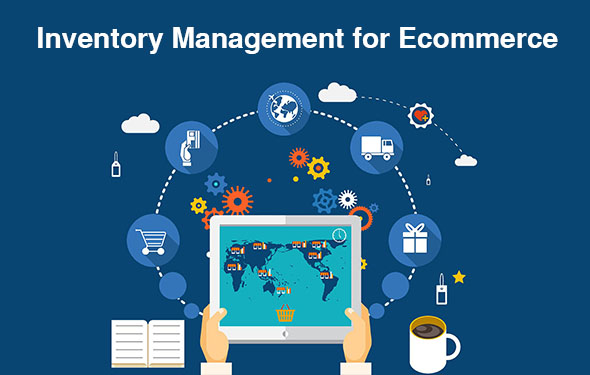A Complete Guide on Inventory Management for Ecommerce in Dubai UAE
In today’s modern and technological era, a sustainable ecommerce business is entirely dependent upon proper inventory management. Whatever be the size of your business, small, medium or large, the management of inventory is an important part which plays a huge role in making your business successful and is an essential criterion for ecommerce website development. If you have a poor inventory management system, it can lead to the loss of revenue, and poor customer relationships that are hard to recover. Since the inventory management is so significant for a successful business, the business owners and entrepreneurs largely focus on it and they keep it as their top priority.
Inventory management is all about keeping track of the products and items from the beginning to the end. It is the process of overseeing the pricing, volume, and diversity of the products. If you want to witness growth in your ecommerce business, then along with a unique e-commerce website development strategy, it’s also essential to maintain the inventory effectively.Glossary of terms and terminologies you should know
Before you begin optimizing your inventory management, it is definite to know certain terms and concepts which will help you in making more strategic decisions and be more informed about it. Thus, these terminologies will help you better understand and you will become more familiarized.
- Inventory: It basically refers to the various tangible goods, products, and items which are being sold to the customers.
- Units of Measure: The units that you use in measuring your stock. It can be bundles, pieces, ounces, kilograms, etc.
- Supply Chain: It refers to the processes and systems which are used for producing, managing, and distributing any piece of inventory like goods, etc.
- Minimum Viable Stock: It is the minimum amount of a product which one needs in-hand to fulfill the demand of the consumers without delay.
- SKUs: The stock keeping unit or SKU is a unique identification code, which is used for classifying as well as for organizing your products.
- Variants: It is defined as the variations of the same product with different colors or finishes.
- FIFO: FIFO refers to “First In First Out.” It is an accounting method which determines that sellable assets such as raw materials, inventory, and other items or components that were acquired first will be sold first. In other words, the oldest inventory is sold first for determining the profitability
- Dead Stock: Deadstock is the inventory that you have in stock, but you can’t sell it anymore.
- ABC Analysis: This is a method of prioritizing the inventory that you already have by using three categories:
High-value products
2. Moderate value products
3. Low-value products
- COGS: COGS, or the Cost of Goods Sold, is described as an accounting term that is reported on the income statement and it determines the total cost of the products/items sold by a business.
- Dropshipping: This is a fulfillment method where inventory is not actually stored onsite. Instead, all inventory is shipped directly from a third party to the customer.
- JIT: JIT, or Just-in-time, is a fulfillment method in which inventory orders are made on-time to keep up with the demand of your customers.
- Inventory Management Software: Inventory management software are tools that aid you in tracking inventory, automating tasks like data entry, leveraging data and streamlining processes to help business management to be successful.
- Inventory Forecasting: This is something which refers to making an informed decision about ordering and reordering of certain products. It depends upon the historical data, seasonality, and market trends.
Common Challenges that Business Owners Face from Time to Time
Every ecommerce business at one point or the other face some serious challenges. These challenges or issues should be addressed ahead of time. Otherwise, it will affect both the profitability and the growth of your ecommerce business. Take a look at some of the challenges of the inventory management which should not be overlooked in any ecommerce Website Development plan:
-
Overstocking and overselling
If you are dealing with ecommerce, then, undoubtedly, you should have a good grasp on the inventory management. Otherwise, you might fall into a situation where the inventory is either overstocked or understocked. In a situation where your inventory is overstocked and there is not enough demand, you might face the risk of having too much dead stock. On the other hand, if your inventory is understocked, then there is a high risk of losing sales for your business as you will not be able to maintain and keep up with the demands of the customers with the limited amount of inventory items.
2. Manual management
This is another challenge which most of the business owners face while scaling their business in the long run. During the early stages of the ecommerce business, it is quite easy to track and fulfill orders manually, but when you think of the long run, you find that it’s quite difficult to meet the growing demand of the customers. Thus, if you rely on manual management, then you will not be able to keep a track on your working with multiple business partners and manufacturers and it also becomes tough to maintain the storing inventory at multiple warehouses across the country.
However, if you want to keep track of every aspect of your business and manage them equally well, then it’s obvious to adopt more scalable inventory management tactics and tools.
3. Lack of visibility
Another common problem that most of the ecommerce business owners face is the lack of visibility across multiple channels with the increasing demand for products and services. With the inventory management software, you can easily keep track of all the sales and orders which is having an impact on the inventory. If you do not have complete visibility of the entire inventory management system, then you won’t be able to make effective decisions regarding your business. Moreover, you also won’t be able to boost sales and meet the customer’s demand on time.
4. Lack of insight
If you are concerned about boosting sales and want to gain success in business, then you must have a proper insight into it.
Information on Inventory Management System and Software
Inventory management is highly important for keeping track of your business in a particular location. If you take help of a reliable inventory management software, then you can assure that there will be no underselling or overselling of your products and services. It allows you to keep a proper track of the inventories of your business by integrating all your tools. As these inventory management systems are cloud-based, it comes with several useful features some of which are discussed below:
- Auto-Updated Marketplaces and Shopping Carts: If you want to reflect more accurate levels of inventory, then this software can include the supplier quantity in your online selling channels immediately.
Restock Forecasting: With the growth in your business, the demand of the consumers also increases. This literally means you have experience, growth as well as new customers. Another advantage of an Inventory management software is that it helps in forecasting when you need to restock and you also get to know how much you need to restock. Thus, it keeps you updated with the customer’s demand for ensuring your business growth. It automatically calculates dynamic reorder points depending upon the inputs.
Barcode Scanning: Barcode and scanning solutions help in improving the accuracy in the warehouse. It helps every item of the inventory to stay accounted from the warehouse to the customer. It not only helps in keeping track of stock, transfers, and batches of inventory but also improves the traceability of items and overall accuracy in the management of the inventory.
4. Multichannel Marketplace Support: The Inventory management software helps in keeping everything connected if you operate your business from multiple channels and marketplaces. Therefore, it is quite useful for ecommerce businesses as they have a lot of online channels and thus require to keep track of everything with accurate updates. Even the software allows accessibility from all mobiles, tablets, and computers.
Hope that these pieces of information have helped you a lot in knowing everything about the inventory management. Thus, if you are a business owner or entrepreneur and are looking forward to using inventory management for your business, then you have made the right choice.
Some Frequently Asked Questions:
- What is effective inventory management?
A well-functioning process of overseeing the flow of items in and out of your stock is known as effective inventory management. It is the balance of having enough products in the warehouse. Also, it keeps the stock costs under control so that you can run your business successfully and smoothly.
- What is the best way to manage inventory?
- Fine-tune your forecasting
- Use the FIFO approach (first in, first out)
- Identify low-turn stock
- Audit your stock
- Use a cloud-based inventory management software
- Track your stock levels at all times
- Reduce equipment repair times





